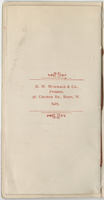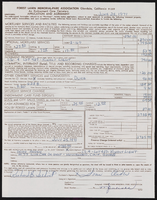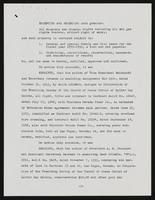Search the Special Collections and Archives Portal
Search Results
Audio recording clip of interview with Jerome Zawada by Suzanne Becker, August 9, 2006
Date
Archival Collection
Description
Sound

Transcript of interview with Alice Ward Boyer by Joanne Goodwin, June 26, 1996
Date
Archival Collection
Description
Alice Ward Boyer arrived in Las Vegas from Oklahoma in 1937. Her brother and former husband came earlier to escape the dustbowl depression and get settled. In the middle of the summer, just at dusk, she emerged from the train at Kingman, Arizona with her two small children to meet her family and drive through the darkness to her new home in Las Vegas. Although she missed the trees of the Plains, she soon became accustomed to her desert home. Her recollections revive the older Las Vegas when community life characterized the small town. At the heart of her story is the Mesquite Club. The non-partisan civic activities of the Mesquite Club are part of a national history of women’s club voluntarism in the nineteenth and twentieth century United States. Founded in 1911, this pioneer Las Vegas women's club played an essential role in the development of the growing town. When few cultural or social services existed, the club raised funds for the first public library, developed parks for the city, and provided services and funding for the aged and youth. The Mesquite Club, along with the Parent Teacher Association, scouts, and church activities formed a network of community relations commonly found in developing towns and cities, but not ususally associated with Las Vegas. Alice Boyer joined the Mesquite club in 1944. She first served as the chair of the Garden Committee, then "went right up through the chairs," and was elected President of the club for 1958-59. (See Table of Offices Held). Speaking about the Mesquite Club founders, Alice Boyer said, “They were very forward-looking women. They knew that the town would grow and they wanted the best for the town.” As one of the second generation of members, she has found the club to be a continuing source of congenial social life and civic community building. Born in rural Oklahoma, she spent her early years on a ranch. Her parents met there shortly after "the run to open Oklahoma" around 1892. They met, married and had twelve children, nine of which survived. Alice came right in the middle. She spent her early years riding horses, wearing “overalls," and spending as much time as possible outside. The family moved into Clinton, Oklahoma for better schools for their children when she was in the fifth grade. Alice graduated from high school just as the Great Depression began and worked briefly at a newspaper before marriage. At the time of the interview, Alice Boyer’s vivaciousness, gracious manner, and sharp memory belied her 82 years. This interview has been produced with the assistance of the Mesquite Club and the History Department of the University of Nevada, Las Vegas. It is part of a series on women community builders in Las Vegas. The transcript has been edited only slightly for clarity while the syntax and style of the narrator were retained.
Text
Catherine Abrigo oral history interview
Identifier
Abstract
Oral history interview with Cathrine Abrigo conducted by Cecilia Winchell and Stefani Evans on July 20, 2022 for the Reflections: the Las Vegas Asian American and Pacific Islander Oral History Project. In this interview, Abrigo describes her early life in the Philippines, where she attended Catholic school and briefly studied medical technology in college. She describes immigrating to Las Vegas, Nevada with her husband and the difficulty of leaving her immediate family behind. She discusses working for the Cosmopolitan in 2011 and becoming deeply involved with the Culinary Workers Union Local 226. Throughout the interview, Abrigo talks about religion, food, and her activism with the Culinary Union.
Archival Collection
Marguerite Segretti oral history interview
Identifier
Abstract
Oral history interview with Marguerite Segretti conducted by Tommy Rendano on February 24, 1977 for the Ralph Roske Oral History Project on Early Las Vegas. In this interview, Segretti discusses her personal history and life in Las Vegas, Nevada. Segretti discusses her career as the Clark County Democratic Central Committee Chairman, a position which she was serving in at the time of the interview, and politics on the local and national level. Segretti describes how Las Vegas has changed and expanded, life in Las Vegas, and the presence of religion in Las Vegas. Segretti also discusses sex work and prostitution in Las Vegas and the rest of Nevada, as well as misconceptions people have about the city.
Archival Collection

Dr. Ruben J. Acherman interview, July 18, 2019: transcript
Date
Archival Collection
Description
Interviewed by Monsserath Hernandez, Laurents Bañuelos-Benitez, and Claytee White. Dr. Acherman has been practicing in Southern Nevada for nearly 20 years and continues to care for the community at the Children's Heart Center of Nevada in Las Vegas. Born and raised in the small town of Palmira, Colombia with his two sisters and parents. His father is from Romania and immigrated to Ecuador while escaping from Nazi occupied Europe during World War II. Dr. Acherman eventually moved to Cali, Colombia in order to attend medical school. knowing that he wanted to specialize in cardiology and being unable to do cardiology in Colombia he immigrated to the U.S. and specialized in pediatrics at USC. After practicing for two years in Toronto, he was contacted by Dr. Evans in 2001 with an offer to work at his practice in Southern Nevada where he was able to successfully perform the first balloon dilation in the state of Nevada.
Text
Donna Rodriguez oral history interview
Identifier
Abstract
Oral history interview with Donna Rodriguez conducted by Justin Burrows on November 24, 2014 for the African Americans in Las Vegas: a Collaborative Oral History Project. In this interview, Rodriguez discusses her personal history and moving to Las Vegas, Nevada in 1993. She describes her first impressions of the city, her employment at McCarran International Airport, and working as a security dispatcher for casinos. Rodriguez then talks about the development of security surveillance at casinos, discrimination towards African American gamblers, and recalls the training she received. Later, Rodriguez discusses her church involvement, teaching at her church's Sunday school, and shares how she managed to raise her children on her own. Lastly, she talks about the role that politics had on minority communities, the importance of education, and changes in Las Vegas.
Archival Collection

Transcript of interview with Linda Lintner by Claytee White, February 12, 2013
Date
Archival Collection
Description
The daughter of a soldier, Linda Lintner and her mother traveled from North Carolina to Overton, Nevada to stay with Linda's grandparents when she was only six weeks old. After her father joined the family, they moved to Las Vegas where both her mother and her father started working at the Post Office. Linda attended local elementary and middle schools in the valley, and in due time, Rancho High School. In this interview, Linda shares not only her memories of growing up in Las Vegas but also fascinating stories about the almost decade long round the world sailing journey that she and her second husband began in 1986. In the course of the decade, Linda became a qualified diver, and expert sailor, and developed a lasting appreciation for the world, its oceans - and the skills you learn when you live on a boat with one other person for so very long. Since their return, Linda has been keeping busy, volunteering many hours with local veterans homes and the church - we are fortunate that she was able to spend time with our interviewer, too, to share her memories of growing up in Las Vegas.
Text



